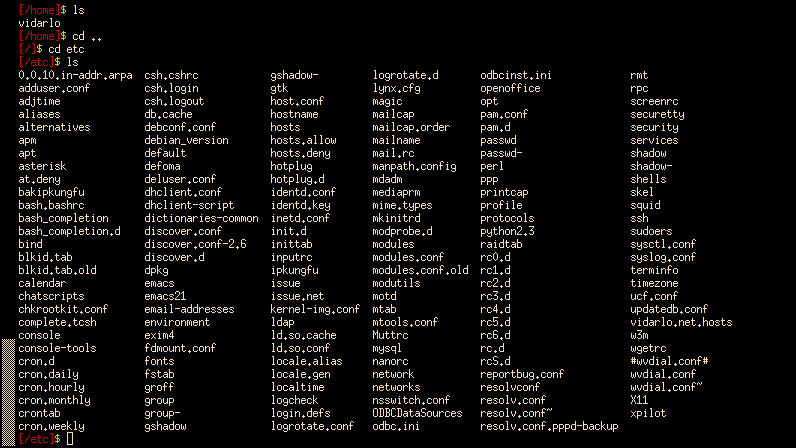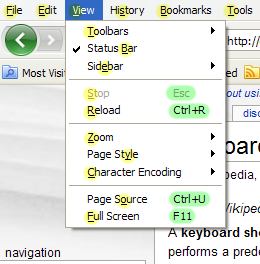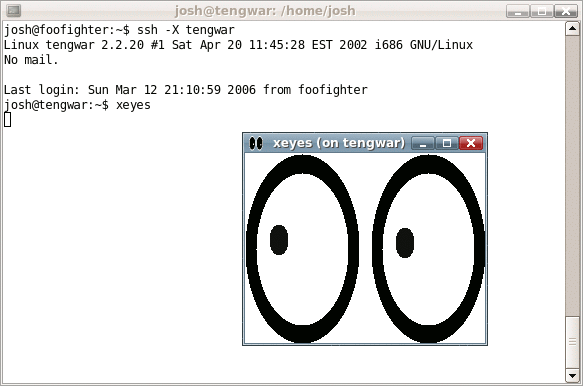|
Cwm (window Manager)
cwm (Calm Window Manager) is a stacking window manager for the X Window System. While it is primarily developed as a part of OpenBSD's base system, portable versions are available on other Unix-like operating systems. History Development of cwm started from patches to evilwm by Marius Aamodt Eriksen. To ease the implementation of new features, cwm was eventually rewritten using some code from 9wm. The last release by the original author came out in August 2005. In April 2007, cwm was imported into the OpenBSD source tree. By January 2008, a substantial part of the original source code, including all of the 9wm code, was rewritten. cwm has been distributed with OpenBSD since version 4.2, where it replaced wm2. A third-party Linux port also exists. Description cwm is a stacking window manager oriented towards heavy keyboard usage, small footprint and ease of use. While it lacks explicit virtual desktops functionality, it can be emulated by using the window groups mechanis ... [...More Info...] [...Related Items...] OR: [Wikipedia] [Google] [Baidu] |
OpenBSD
OpenBSD is a security-focused operating system, security-focused, free software, Unix-like operating system based on the Berkeley Software Distribution (BSD). Theo de Raadt created OpenBSD in 1995 by fork (software development), forking NetBSD 1.0. The OpenBSD project emphasizes software portability, portability, software standard, standardization, software bug, correctness, proactive computer security, security, and integrated cryptography. The OpenBSD project maintains portable versions of many subsystems as package manager, packages for other operating systems. Because of the project's preferred BSD license, which allows binary redistributions without the source code, many components are reused in proprietary and corporate-sponsored software projects. The firewall (computing), firewall code in Apple Inc., Apple's macOS is based on OpenBSD's PF (firewall), PF firewall code, Android (operating system), Android's Bionic (software), Bionic C standard library is based on OpenBSD c ... [...More Info...] [...Related Items...] OR: [Wikipedia] [Google] [Baidu] |
Terminal Emulator
A terminal emulator, or terminal application, is a computer program that emulates a video terminal within some other display architecture. Though typically synonymous with a shell or text terminal, the term ''terminal'' covers all remote terminals, including graphical interfaces. A terminal emulator inside a graphical user interface is often called a terminal window. A terminal window allows the user access to a text terminal and all its applications such as command-line interfaces (CLI) and text user interface (TUI) applications. These may be running either on the same machine or on a different one via telnet, ssh, dial-up, or over a direct serial connection. On Unix-like operating systems, it is common to have one or more terminal windows connected to the local machine. Terminals usually support a set of escape sequences for controlling color, cursor position, etc. Examples include the family of terminal control sequence standards that includes ECMA-48, ANSI X3.64, ... [...More Info...] [...Related Items...] OR: [Wikipedia] [Google] [Baidu] |
Free Software Programmed In C
Free may refer to: Concept * Freedom, the ability to act or change without constraint or restriction * Emancipate, attaining civil and political rights or equality * Free (''gratis''), free of charge * Gratis versus libre, the difference between the two common meanings of the adjective "free". Computing * Free (programming), a function that releases dynamically allocated memory for reuse * Free software, software usable and distributable with few restrictions and no payment *, an emoji in the Enclosed Alphanumeric Supplement block. Mathematics * Free object ** Free abelian group ** Free algebra ** Free group ** Free module ** Free semigroup * Free variable People * Free (surname) * Free (rapper) (born 1968), or Free Marie, American rapper and media personality * Free, a pseudonym for the activist and writer Abbie Hoffman * Free (active 2003–), American musician in the band FreeSol Arts and media Film and television * ''Free'' (film), a 2001 American dram ... [...More Info...] [...Related Items...] OR: [Wikipedia] [Google] [Baidu] |
OpenBSD Journal
The OpenBSD Journal is an online newspaper dedicated to coverage of OpenBSD software and related events. The OpenBSD Journal is widely recognized as a reliable source of OpenBSD-related information. It is a primary reporter for such events as Hackathon A hackathon (also known as a hack day, hackfest, datathon or codefest; a portmanteau of '' hacking'' and ''marathon'') is an event where people engage in rapid and collaborative engineering over a relatively short period of time such as 24 or 48 h ...s. The site also hosts the OpenBSD developers' blogs. History The OpenBSD Journal was founded in 2000 and operated until 1 April 2004 at , On 1 April 2004 the editors James Phillips and Jose Nazario announced that the site ceased its operation. Daniel Hartmeier backed up the contents of the journal in order to preserve them. Further investigation to the articles' structure lead to creation of CGI-based engine that would enable access to the deadly.org's content on a backup server. ... [...More Info...] [...Related Items...] OR: [Wikipedia] [Google] [Baidu] |
GitHub
GitHub () is a Proprietary software, proprietary developer platform that allows developers to create, store, manage, and share their code. It uses Git to provide distributed version control and GitHub itself provides access control, bug tracking system, bug tracking, software feature requests, task management, continuous integration, and wikis for every project. Headquartered in California, GitHub, Inc. has been a subsidiary of Microsoft since 2018. It is commonly used to host open source software development projects. GitHub reported having over 100 million developers and more than 420 million Repository (version control), repositories, including at least 28 million public repositories. It is the world's largest source code host Over five billion developer contributions were made to more than 500 million open source projects in 2024. About Founding The development of the GitHub platform began on October 19, 2005. The site was launched in April 2008 by Tom ... [...More Info...] [...Related Items...] OR: [Wikipedia] [Google] [Baidu] |
Concurrent Versions System
Concurrent Versions System (CVS, or Concurrent Versioning System) is a version control system originally developed by Dick Grune in July 1986. Design CVS operates as a front end to Revision Control System (RCS), an older version control system that manages individual files but not whole projects. It expands upon RCS by adding support for repository-level change tracking, and a client-server model. Files are tracked using the same history format as in RCS, with a hidden directory containing a corresponding history file for each file in the repository. CVS uses delta compression for efficient storage of different versions of the same file. This works well with large text files with few changes from one version to the next. This is usually the case for source code files. On the other hand, when CVS is told to store a file as binary, it will keep each individual version on the server. This is typically used for non-text files such as executable images where it is difficult ... [...More Info...] [...Related Items...] OR: [Wikipedia] [Google] [Baidu] |
OSNews
OSNews is a computing online newspaper. It originally focused on operating systems and their related technologies that launched in 1997, but is now aggregating consumer electronics news. The content is managed by a group of editors and the owner. As of 2014, its managing editor is Thom Holwerda, who joined in 2005. OSnews has been referenced by ''TIME'', Ars Technica, ''Wired'', ''Computerworld'', LifeHacker, Linux.com, OMG! Ubuntu! and lwn.net. ''Wired'' described OSnews as "an alternative operating system Web magazine", and in 2011 Holwerda noted that "while the alternative operating systems scene might no longer be the prime focus of OSNews due to a lack of activity in that field, it's still where our heart lies." Staff *Thom Holwerda is managing editor. *David Adams is a publisher and regular contributor. *Eugenia Loli-Queru, the former editor-in-chief of OSNews, resigned in June 2005. Version 2 of OSNews was written by Eugenia in August 2001 when she resurrected the ... [...More Info...] [...Related Items...] OR: [Wikipedia] [Google] [Baidu] |
Comparison Of X Window Managers
This article compares variety of different X window managers. For an introduction to the topic, see X Window System. General information Features See also * Comparison of X Window System desktop environments * Window manager * List of Wayland compositors References External links Comparison of extensible window managerscompares window managers "extensible" by user scripts, like Sawfish, xmonad, etc. ''The Comprehensive List of Window Managers for Unix'' {{X desktop environments and window managers Window managers A window manager is system software that controls the placement and appearance of windows within a windowing system in a graphical user interface. Most window managers are designed to help provide a desktop environment. They work in conjunctio ... X window managers ... [...More Info...] [...Related Items...] OR: [Wikipedia] [Google] [Baidu] |
Minimalism (computing)
In computing, minimalism refers to the application of minimalist philosophies and principles in the design and use of hardware and software. Minimalism, in this sense, means designing systems that use the least hardware and software resources possible. History In the late 1970s and early 1980s, programmers worked within the confines of relatively expensive and limited resources of common platforms. Eight or sixteen kilobytes of RAM was common; 64 kilobytes was considered a vast amount and was the entire address space accessible to the 8-bit CPUs predominant during the earliest generations of personal computers. The most common storage medium was the 5.25 inch floppy disk holding from 88 to 170 kilobytes. Hard drives with capacities from five to ten megabytes cost thousands of dollars. Over time, personal-computer memory capacities expanded by orders of magnitude and mainstream programmers took advantage of the added storage to increase their software's capabili ... [...More Info...] [...Related Items...] OR: [Wikipedia] [Google] [Baidu] |
Key Binding
In computing, a keyboard shortcut (also hotkey/hot key or key binding) is a software-based assignment of an action to one or more keys on a computer keyboard. Most operating systems and applications come with a default set of keyboard shortcuts, some of which may be modified by the user in the settings. Keyboard configuration software allows users to create and assign macros to key combinations which can perform more complex sequences of actions. Some older keyboards had a physical macro key specifically for this purpose. Terminology The precise words used for these assignments and their meaning can vary depending on the context. For example, Microsoft has generally used ''keyboard shortcuts'' for Windows and Microsoft Office since the transition to 64-bit for Windows 7. However, they used ''hot keys'' prior to that and continue to do so in their 32-bit API for developing 'classic desktop apps'. Meanwhile, Lenovo and ASUS each have keyboard configuration software made ... [...More Info...] [...Related Items...] OR: [Wikipedia] [Google] [Baidu] |
Secure Shell
The Secure Shell Protocol (SSH Protocol) is a cryptographic network protocol for operating network services securely over an unsecured network. Its most notable applications are remote login and command-line execution. SSH was designed for Unix-like operating systems as a replacement for Telnet and unsecured remote Unix shell protocols, such as the Berkeley Remote Shell (rsh) and the related rlogin and rexec protocols, which all use insecure, plaintext methods of authentication, like passwords. Since mechanisms like Telnet and Remote Shell are designed to access and operate remote computers, sending the authentication tokens (e.g. username and password) for this access to these computers across a public network in an unsecured way poses a great risk of 3rd parties obtaining the password and achieving the same level of access to the remote system as the telnet user. Secure Shell mitigates this risk through the use of encryption mechanisms that are intended to hide th ... [...More Info...] [...Related Items...] OR: [Wikipedia] [Google] [Baidu] |
C (programming Language)
C (''pronounced'' '' – like the letter c'') is a general-purpose programming language. It was created in the 1970s by Dennis Ritchie and remains very widely used and influential. By design, C's features cleanly reflect the capabilities of the targeted Central processing unit, CPUs. It has found lasting use in operating systems code (especially in Kernel (operating system), kernels), device drivers, and protocol stacks, but its use in application software has been decreasing. C is commonly used on computer architectures that range from the largest supercomputers to the smallest microcontrollers and embedded systems. A successor to the programming language B (programming language), B, C was originally developed at Bell Labs by Ritchie between 1972 and 1973 to construct utilities running on Unix. It was applied to re-implementing the kernel of the Unix operating system. During the 1980s, C gradually gained popularity. It has become one of the most widely used programming langu ... [...More Info...] [...Related Items...] OR: [Wikipedia] [Google] [Baidu] |




